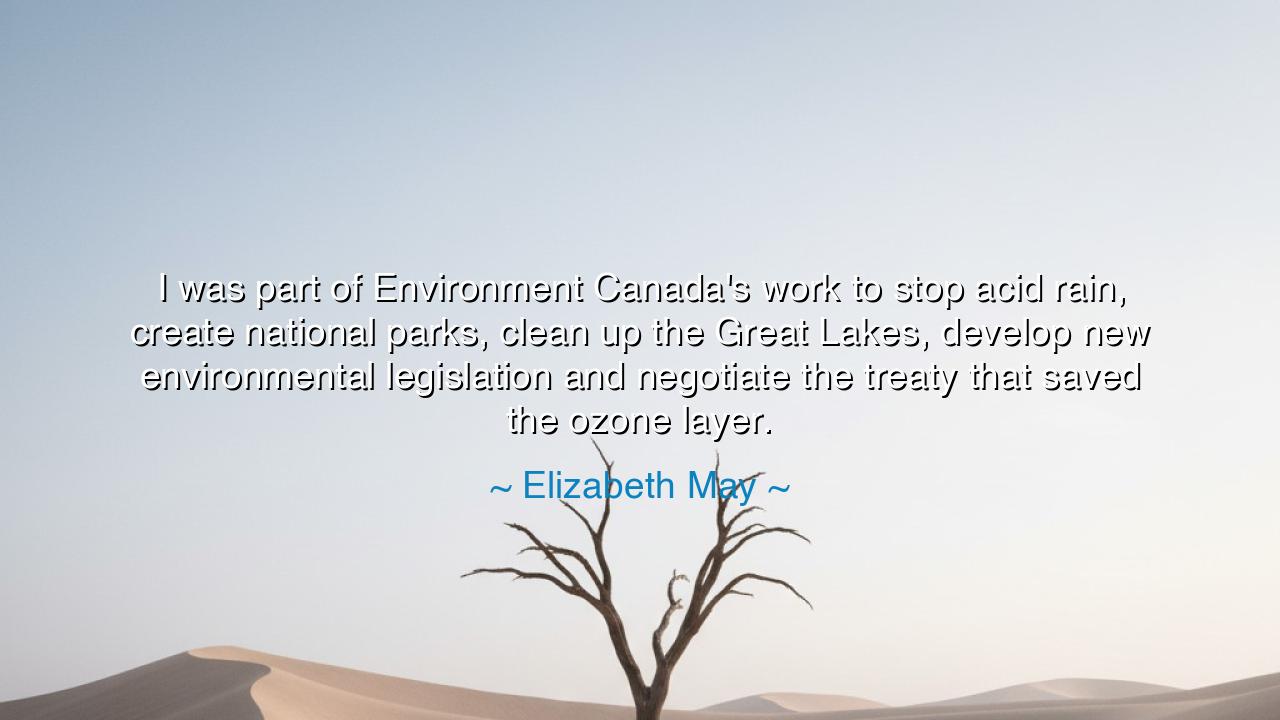
I was part of Environment Canada's work to stop acid rain, create
I was part of Environment Canada's work to stop acid rain, create national parks, clean up the Great Lakes, develop new environmental legislation and negotiate the treaty that saved the ozone layer.






Hear the voice of Elizabeth May, champion of the earth, as she declares: “I was part of Environment Canada’s work to stop acid rain, create national parks, clean up the Great Lakes, develop new environmental legislation and negotiate the treaty that saved the ozone layer.” These words are not mere recollections of service but a record of battles fought for the living world. They shine like milestones upon the path of environmental stewardship, showing us that through courage, law, and unity, humankind can yet preserve the gifts of creation.
The meaning of this quote is rooted in the recognition that threats to nature are vast and mighty, but not unconquerable. Acid rain, born of smokestacks and industry, once fell upon forests and waters, killing trees, poisoning lakes, and leaving the land in silent ruin. Yet through science, diplomacy, and regulation, it was curbed. The ozone layer, once thinning above our heads from reckless chemicals, was restored through a treaty that bound nations together in common cause. The Great Lakes, once choking in pollution, were cleansed through effort and persistence. In these victories, Elizabeth May reminds us that destruction is not fate—action can turn back the tide.
History gives us many such lessons. Consider the smog that shrouded London in 1952, killing thousands in mere days. Out of that tragedy arose new laws to clean the air, marking a turning point for Britain. Or look to the Montreal Protocol, the treaty May speaks of, signed in 1987. Nations agreed to ban ozone-depleting chemicals, and for one of the first times in human history, a global ecological crisis was not only recognized but answered. Today the ozone hole shrinks, a rare testament to human unity. These are triumphs carved not in stone, but in cleaner skies and renewed forests.
But let us not mistake these victories as final. The same pattern of destruction still looms—climate change, deforestation, and poisoned waters echo the battles of acid rain and vanishing ozone. May’s words remind us that what was done before must be done again, only with greater speed and greater resolve. For each generation faces its own guardianship, and if one age falters, the burden grows heavier for the next.
The deeper lesson of May’s words lies in national parks and environmental legislation. For while treaties and science are mighty, so too is the act of setting aside land, protecting rivers, and enshrining the care of nature into law. Parks are sanctuaries for creatures who cannot speak, for forests that cannot defend themselves. Laws are the shields that protect the earth when profit and power would consume it. Without them, even the victories of today would wither tomorrow.
For us, the call is clear. Support those who defend creation not only with words but with laws, treaties, and tireless labor. Live not as plunderers, but as guardians. When rivers are threatened, speak for them; when forests are cut down, stand beside them. And remember always that no effort is too small: each act of care joins a greater chorus that, together, has already healed skies and restored waters.
Practical action lies before every hand. Conserve energy, reduce waste, honor parks and wild places by visiting them with reverence. Support leaders and movements that fight for strong environmental legislation. Teach your children that the earth is not an inheritance to be squandered but a trust to be safeguarded. In so doing, we walk the same path as Elizabeth May, carrying forward the mantle of stewardship into our own time.
Thus let her words be remembered as both triumph and challenge. The victories of the past—against acid rain, for the ozone layer, for the Great Lakes—are proof that humanity can rise to meet its greatest tests. But they are also a reminder that the work is never finished. Let each of us take up this charge, that our children may one day speak as Elizabeth May does—not of what was lost, but of what was saved.






AAdministratorAdministrator
Welcome, honored guests. Please leave a comment, we will respond soon